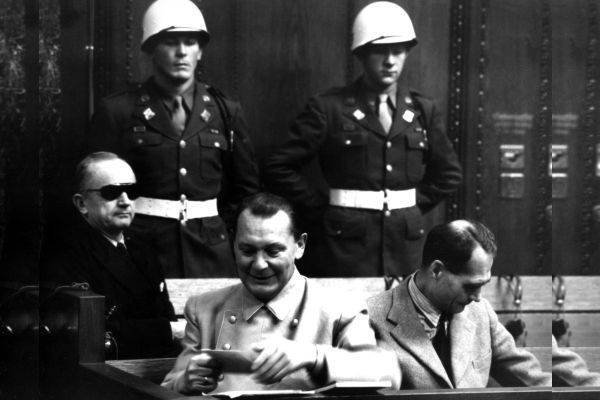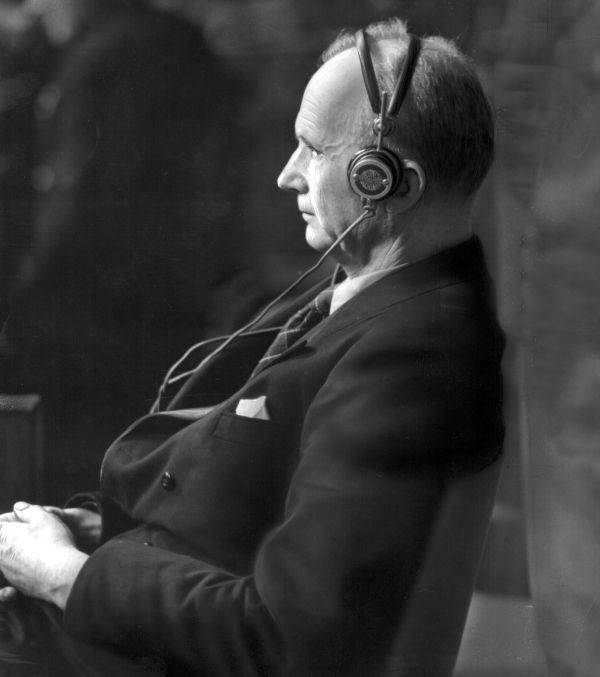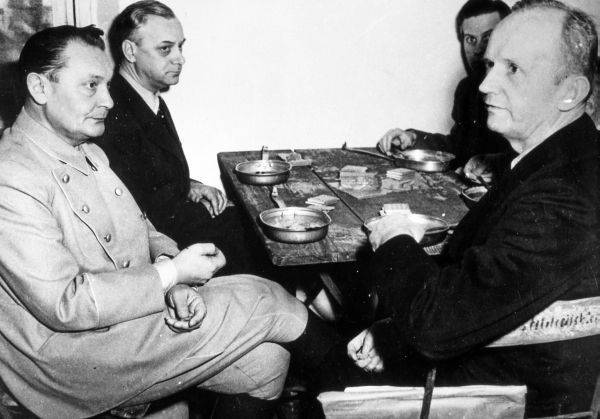"The Last Fuhrer"

November 20 The International Military Tribunal (MW) began its work in Nuremberg in Nuremberg, which sentenced the top leadership of Hitler's Germany. Roman Andreyevich Rudenko, the chief prosecutor from the USSR, in his speech directly called: "May the judgment of the people be done on the Nazi executioners - fair and severe." But to what extent did the MVT's verdict follow up on the results of the Nuremberg Trials, announced 1945 of October 403 of the year? Of the 1 defendants, only 1946 were sentenced to death, three of them were acquitted.
And Hitler’s official successor, Karl Doenitz (1891 - 1980), who took 30 on April 1945 at the head of the German state and armed forces, was sentenced only to years of imprisonment in 10.
Nimitz did not listen
In the infamous 1 17 Order of Laconia, 1942 in September, none other than Doenitz, prohibited submarine commanders to select people from sunken ships - except for captains and mechanics who were considered prisoners of war. This document was interpreted by the judges as an order to shoot sailors who escaped from sunk ships. War crimes were committed against Doenitz - attacking and destroying ships, including civilians, on the high seas. The accused admitted that he had ordered to sink bli neutral countries.
Nevertheless, at a trial in Nuremberg, some lawyers and witnesses tried to challenge Doenitz's guilt. US judge Francis Biddy even argued for his acquittal, citing the fact that the victors in the war also drowned German ships. Giving Written Testimony to the Commander-in-Chief of the Pacific fleet USA Chester William Nimitz noted: “As a rule, American submarines did not rescue sailors from enemy ships if the ships were exposed to unnecessary or additional risk, or if the submarines were forced to distract from this military order.” 2
However, the international court recognized the attacks on German ships as defense against the aggressor, and Doenitz - a criminal against peace and humanity. The representatives of Great Britain and the USSR were united in this. Thousands of innocent people died due to Doenitz. Restoring historical the truth about the "feats" of the grand admiral, the West German press noted that "the damned admiral is personally responsible for the deaths of 27 sailors of the German submarine fleet and many thousands of sailors of the allied fleets" 494.
October 1 1946, after Goering and several other top Nazis were sentenced to death, the Nuremberg Tribunal read the sentence to Doenitz. The grand admiral was convicted of 2 (crime against peace) and 3 (war crimes) counts and sentenced to 10-year imprisonment. However, the death penalty Doenitz, according to the judges, did not deserve it. The Soviet side did not object to the sentence against Hitler’s successor.

Leader "wolf packs"
When Hitler came to power, Doenitz served in Wilhelmshaven at the headquarters of the North Sea region, where he was responsible for ensuring the internal security of the fleet. 1 February 1935 of the year Hitler ordered the construction of submarines to begin, and six weeks later he refused to comply with the articles of the Versailles Treaty limiting Germany’s military capabilities. 6 June 1935, Doenitz was assigned to the Führer of Submarines and took charge of the 1 Submarine Flotilla.
By 1938, Doenitz developed the wolf pack tactics - group submarine attacks on enemy ships4. And in October 1939 of the year was promoted to rear admirals. 30 January 1943 Mr. Doenitz was awarded the highest title of Grand Admiral in the German Navy. During Operation Overlord - the landing of Anglo-American troops in France, which began on 6 on June 1944. - Doenitz was last ordered to attack the allies with massive forces. 36 submarines participated in the battle, less than half of them survived. But Doenitz continued to throw all the new boats into battle, apparently hoping in this way to turn the tide of the war. His stubbornness and recklessness caused the death of many: from 820 Germanic submarines participating from 1939 to 1945 in the "Battle of the Atlantic", 781 died; of 39 thousand submariners of the Kriegsmarine, 32 thousand were killed, of which the majority - in the last two years of the war5.
The grand admiral put everything into practice, including the most senseless, of his Fuhrer, who understood nothing about the naval strategy: for him, as Doenitz wrote, “the war at sea was something far and not very clear.” Doenitz did not approve, but he fulfilled Hitler's plans, with the support of the fleet, to hold Tunisia in the spring of 1943, or to defend the Kurland boiler from the Red Army. The Hitlerite grouping in Kurland fought from October 1944 on 15 in May 1945. It only surrendered a week after the surrender of Germany.
All his life the admiral was a loyal and enthusiastic supporter of Hitler. "Heaven sent us the Führer's leadership!" - He exclaimed, speaking to the sailors. One day, turning to a jubilant crowd in Berlin, he said that Hitler had foreseen everything and had not taken a single wrong step. “We are worms compared to him!” 6.
Successor
In April 1945, even Doenitz made it clear that the days of the Third Reich were numbered. On April 19, the Grand Admiral evacuated his headquarters in a suburb of Berlin. A day later, the Soviet burst into it Tanks. On April 20, Doenitz visited Hitler in the bunker of the Reich Chancellery and was present at his 56th and last birthday.
Hitler wrote in "political testament" of 29 in April: "Before I die, I exclude Reichsmarshal Hermann Goering from the party and deprive him of all rights ... Instead of him, I appoint Reich President and Supreme Commander-in-Chief Grand Admiral Denitz."
After 10 hours of the evening 1 in May, when Hitler was already dead, Goebbels and his wife died in the Reich Chancellery's garden, and the inhabitants of the Fuhrer’s bunker sought salvation in the tunnels of the Berlin subway, Hamburg’s radio interrupted the broadcast with the solemn Brukner Seventh Symphony. There was a battle of military drums, and the announcer spoke: "Our Fuhrer, Adolf Hitler, fighting to the last breath against Bolshevism, fell for Germany this afternoon at his operational headquarters in the Reich Chancellery. Grand Admiral and successor to the Fuhrer "30.
After the announcement of the announcer, the voice of Doenitz was heard, which repeated the lie about the “heroic” death of Hitler. “German men and women! Soldiers of the German army!” Called Doenitz on the radio. “My first task is to save the German people from the advancing Bolshevik enemy. Only for this purpose the armed struggle continues. And as long as the British and Americans hinder the achievement this goal, we will be forced to continue to defend against them and fight them. In this case, the British and Americans continue to fight not in the interests of their people, but to spread Bolshevism in Europe "8.
In the order for the troops, Doenitz said that he took command of all the German armed forces and "imbued with the desire to continue the fight against the Bolsheviks until the fighting forces and hundreds of thousands of families living in the eastern regions of German territory were saved from enslavement and destruction" 9.
Agony
At the Nuremberg Trials, Doenitz openly lied, claiming that he allegedly did not even consider himself Hitler's successor and felt that he had been chosen to negotiate peace and prepare for surrender, because only a person far from politics could do it. Ostensibly for this reason, Doenitz accepted his appointment.
2 May 1945. Hitler's successor moved his headquarters to the cadet corps in Murwick near Flensburg, on the border with Denmark. Flensburg, guarded by a battalion of sailors, became the temporary capital of the Reich. In the conditions of the inevitable defeat of Germany, Doenitz tried to achieve a speedy truce with the Western allies and at the same time sought to withdraw as many troops and civilians from the territories that could be occupied by the Red Army. To do this, the grand admiral sent all the ships at his disposal to the Baltic ports, which were still in the hands of the Germans, with orders to take out all the refugees from there. As a result, in the week remaining until the complete and unconditional surrender of Germany, 2 million people were taken to the west by the forces of the fleet.

Two unconditional surrenders
On 1.30 on the night of May 7, Doenitz made radio on that Colonel General Jodl was given full authority to sign the Act of Unconditional Surrender, which he did on May 7 on 02.41. However, Stalin declared: “The treaty signed in Reims cannot be canceled, but it cannot be recognized. The surrender should be committed as the most important historical act and was adopted not in the territory of the victors, but where the fascist aggression came from - in Berlin, and not unilaterally, and necessarily the supreme command of all countries of the anti-Hitler coalition "10. By agreement between the governments of the USSR, the USA and the UK, an agreement was reached to consider the procedure in Reims provisional. The Allies agreed to hold the ceremony of the second signing of the surrender of Germany in the defeated capital of the Reich.
It happened on May 8 in 22.43 Central European Time (May 9 on Moscow 00.43) in the Karlshorst suburb of Berlin in the building of a former military engineering school. The Act was signed by the Government of Doenitz: the Chief of the Wehrmacht Supreme Command, Field Marshal Keitel, General, Commander of the Luftwaffe, Colonel General Stumpf, and the Commander of Kriegsmarine, Admiral Friedeburg. Unconditional surrender was accepted by Marshal of the Soviet Union Georgy Konstantinovich Zhukov and Deputy Commander of the Allied Expeditionary Forces Marshal Arthur Tedder (Great Britain). General C. Spaats (USA) and General J. de Latre de Tassigny (France) put their signatures as witnesses. The Second World War in Europe ended.
23 in the morning at 9.45 in the morning Doenitz was delivered to the ship "Patria" to Major General of the US Army Lowell V. Rook. Denits announced that he and the members of his government are now prisoners of war. So why did Hitler's successor avoid the death sentence?
A ten-year sentence was handed down on the basis of the peculiarities of the trial. Grand Admiral tried to shield the Americans, whose position can be explained from purely pragmatic considerations: a person who agreed to unconditional surrender should not be punished too harshly. As a result, Dönitz’s predecessor as commander of the German fleet, Roeder received a life sentence (albeit in January 1955 was released from prison for health reasons), and Hitler's changer received a rather symbolic term.
The Soviet side acted including on the basis of information received from Dönitz himself. During the interrogation of 17 June 1945 g. He showed that he was not involved in the planning of hostilities against the USSR, which, indeed, was an important argument. The grand admiral told that he was not a member of the Nazi party - that is, for participating in the ideological design of the Nazi regime, it would be difficult to attract him.
Life after Nuremberg
10-year punishment Doenitz served his time in the Spandau prison in Berlin. In conversations with the American prison psychiatrist, Dr. Leon Goldendensom dreamed: "I will buy a small apartment for myself and will live there with my wife, closing myself from the rest of the world, I will write memoirs. I think I have to do this for the German people. So that they can understand what really happened and how few of us in the country's leadership knew about the atrocities of Hitler and Heinrich Himmler "11.
1 October 1956, after fully serving his sentence, Doenitz was released. In old age, the former grand admiral became a zealous Catholic, attended church every Sunday, prayed earnestly. And he was very offended by the government of Adenauer, who refused to pay him an admiral's pension, limiting himself to the captain, arguing that the pensioner was an accomplice of Hitler.
The former "last Führer" demanded that the government arrange a solemn funeral for him and put him in a coffin in the uniform of a grand admiral. However, when 24 December 1980, Mr. Dönitz died, he was buried in civilian clothes without military honors at the Waldfriedhof cemetery in Aumule.
Notes
1. Denitz K. Ten years and twenty days. Memories of the commander-in-chief of the naval forces of Germany. 1935-1945 M., 2004. Ch. 14 "Laconia".
2. U-Boot-Krieg. Sammelband 2 (1942-1945). Die Zeit der Abrechnung. Augsburg, 2004. S. 1000.
3. Nachruf. Karl Dnitz // Der Spiegel. 1981. N 1.
4. Dnitz K. Deutsche Strategie ... S. 15.
5. Herzog B. 60 Jahre deutsche U-Boote. 1906-1966. Mnchen, 1968.
6. Encyclopedia of the Third Reich. M., 1996. C. 205.
7. Shearer U. The rise and fall of the Third Reich. T. 2, M., 1991. C. 522.
8. The agony and death of Adolf Hitler. M., 2000, p. 141.
9. Ibid. With. 143.
10. Shtemenko S.M. General Staff during the war. M., 1989. C.522.
11. Goldenson L. Decree. cit. C. 42.
Information